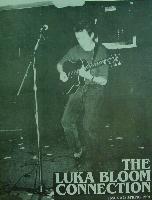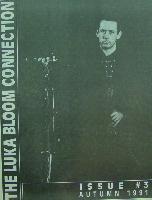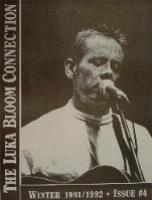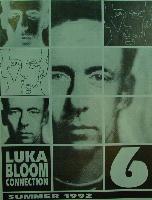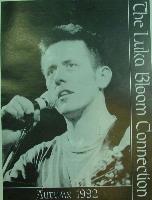HELLO!
Happy 1993 and welcome to Issue #8! Greetings also go to everyone who
has become part of the Connection ("Connectors", as Luka calls us)
since the las issue, and thanks to those who have participated.
What's Luka been up to, you ask? Well, after he left America at the beginning
of November '92, Luka spent almost a month in Australia, a first-ever for him.
As far as I can tell, from all the wonderful letters I've received, Luka fared
extremely well. When I asked him how he liked Australia, he enthusiastically
replied, "Brilliant!"
After those shows, he did a week's worth of gigs in Germany in December,
along with The Pogues, as part of their 'Celtic Christmas tour, German
Connection subscriber Anke Dynewskiy went to see one of the shows in
Düsseldorf, and she had this to say: "...the main attraction that
night were the Pogues (well, not for me!). Every single group playing
there was good, particularly Luka, of course, ... Luka did a new song
"The Fertile Rock") which I loved! Unfortunately, it wasn't
easy for him getting through that huge crowd, being on his own, and he
had only played for about 20 minutes. But to me, it was the event of the
night."
In February, Luka officially concluded The Acoustic Motorbike tour by
appearing in New York City for a special appearance at the Bottom Line,
as part of that club's 3-year running "In Their Own Words: A Bunch
of Songwriters Sittin' Around Singing" series, for two shows on the
19th. Joining Luka on stage were Rosanne Cash, David Byrne (of Talking
Heads fame) and Lou Reed. Local DJ/host Vic Scelsa had questions put
to each of them, prodding them into telling anecdotes and then
accompanying that with a song. Allthough most of the audience were
unfamiliar with Luka's music (Scelsa actually introduced him as the
novice of the group!), Luka exhibited his characteristc good-natured
sarcasm and wit. The show-stopper of the evening, as all who were
there can verify without question, was Luka's rendition of
"I Need Love". There might have been maybe only a handful
of "hardcore" Luka-heads there, but by the end of the evening,
he had won the crowd completely over.
Prior to that, however, he did two great shows of his own, also at the
Bottom Line, on the 15th. Two nights later, on the 17th, he played in
Philadelphia, at the Chestnut Cabaret.
Hopefully, all of you who sent me SASE's received a mini-update on info
on these shows in time. I'm sure all of you who got the opportunity to
see/hear Luka on any or all of the NYC shows had a great time, since it's
been almost a year since he was in the New York area. If you wish to be
sent an itinerary for upcoming dates in your area, please send an SASE,
and mark "TOUR DATES" on the envelope. I'll be sure to send
you gig information as soon as I get confirmations on dates and venues.
As Luka will be spending the next few months in Ireland writing and
recording, please don't expect an immediate reply just yet.
According to Dublin's Hot Press music paper, in the 1992 Reader's Poll
Awards, Luka was named as one of Ireland's 10 Best Songwriters.
Included in the list were some pretty impressive names: Bono, Van
Morrison, and of course, Christy Moore.
Hot Press also had a special feature on Ireland's Hottest Acts.
According to the magazine: "A new single protesting against
the proposed interpretative centre of Mullaghmore has just been
released. 1992 was his best year to date; a rousing appearance at
Feile following the acclaimed crossover rap/acoustic hit with LL Cool
J's "I Need Love". The success of the song may well
prompt Luka to explore the genre further in '93, during which we can
look forward to a new album - with keen anticipation."
A lot of you have been writing to me asking about the text record
from Luka. The good news is that a new single has been released,
back in early February of this year.
Titled "The Fertile Rock",
the song is a celebration of the natural desert-like beauty and fragile wildness
of The Burren, in Co. Clare. For any of you who are unfamiliar with the
Burren, it is a rocky ancient landscape on the western seaboard of Ireland.
Burren - the Boirrin, in Gaelic - the "stony place", a limestone
tableland of at least a hundred square miles. William Butler Yeats was
so moved by it, that he wrote a verse play, The Dreaming of the Bones,
set in the ruins of Corcomroe Abbey, a skeleton of greystones
camouflaged against the Burren hills. Georgraphically, the Burren
resembles a lunar plateau, with no surface water, but many caves
and underground rivers. For botanists, it is a hothouse for a great
variety of wildflowers of both Arctic and Mediterranean origins. People
have lived in The Burren from pre-history to the present, and have left
their mark in the form of megalithic tombs, prehistoric silver mines,
standing stones, deserted villages, and early Bronze Age burial grounds.
Apart from being a song about The Burren, "The Fertile Rock"
also serves to inform people of the Irish government's intentions to
construct an "interpretative centre" for tourists, right in the
middle of this unspoiled wilderness at Mullaghmore. This has become
a major issue in Ireland, with the government claiming that the project
will bring much-needed jobs into the area, whereas the opposition,
made up of various environmental groups, quite rightly pointed out
that the number of jobs created will be of a minimum and will not
justify the irreversible damage done to the fragile ecology of this
unique region.
The single, nor surprisingly, has had favorable reaction from Ireland's
Green Party. In a recent Hot Press interview with Green MP Trevor
Sargent, when asked about his feelings about "The Fertile
Rock", he replied: "I think Luka Bloom deserves total
praise for using his art to open people's eyes to the issue, irrespective
of how it may affect his career. The Green Party's position is that
we feel that interpretative centres like Mullaghmore should be
built in towns."
Obviously, during the intense court case that ensued, the presiding
judge must have been listening to the radio, as the government's
plans were declared unconstitutional, for they had not adhered to
planning regulations, and the plans to build the interpretative centre
were declared illegal and were subsequently scrapped, much to the
delight of the opposition groups.
The "bad" news (sort of) is that the single's availability
is limited exclusively to Ireland, as far as I know. Hopefully, it will
be released domestically here in the United States and elsewhere
soon, or perhaps obtainable as an import at your local record shop.
Watch this space for further news.
"Holding Back The River", another great new song, has
been part of Luka's repertoire since last year, and will most likely
show up on the new record, whose release date will probably be
towards the end of this year. I'll keep you posted as I learn more.
Those of you who jumped on the opportunity to contact Tayberry
Music quickly enough to get your hands on the first Luka Bloom
cassette (on Mystery Records) - congratulations! Unfortunately,
since the last issue, I've been told that they've since sold out of
all the copies they had gotten hold of.
That's it for now. Issue #9 should be out by early summer. As
always, if any of you would like to contribute to the Connection,
with either your reviews, photos, art work, classified, letters,
poems, etc., they will be enthusiastically welcomed for future
inclusion in issues to follow.
Until then, be well.
June
The following is an interview with Luka by Jon Casimir, and is
reprinted from Australia's Sydney Morning Herald, November 20th, 1992,
just before Luka was to play at the Enmore Theatre. Special thanks to
Tricia Fitzgerald for sending the clipping. Photo by Patrick Cummins.
 Luka Bloom wearily pushes an index finger into the pouch beneath his right eye.
The Irishman has slept in the eight hours between getting off the plane and sitting
down to be interviewed, but not enough. He is sluggish at first, wary of the
interrogation, uncomfortable - as always, he later points out - with the process
of being photographed. But as the conversation turns to the destruction of some
of music's arbitrary boundaries, a subject near to his creative heart, he loses
the glazed look, revealing himself as a nimble and entertaining thinker
and something of a pop theoretician.
Luka Bloom wearily pushes an index finger into the pouch beneath his right eye.
The Irishman has slept in the eight hours between getting off the plane and sitting
down to be interviewed, but not enough. He is sluggish at first, wary of the
interrogation, uncomfortable - as always, he later points out - with the process
of being photographed. But as the conversation turns to the destruction of some
of music's arbitrary boundaries, a subject near to his creative heart, he loses
the glazed look, revealing himself as a nimble and entertaining thinker
and something of a pop theoretician.
"I believe that what I do is unique," he says softly. "And I believe that it is very
much of the time we're in, as opposed to being of the '60s, the time that is usually
associated with the genre (folk).
"When people imagine a troubadour with a guitar, they usually think of Leonard
Cohen, Bob Dylan, a '60s icon. My role models are all late '70s, early '80s and
going into the '90s. I have been trying to create a style of performance and of writing
which would reach out to people who would listen to Massive Attack or PM Dawn or
Not Drowning Waving or Midnight Oil."
When he discovered the LL Cool J track "I Need Love", on his latest album, The
Acoustic Motorbike, Bloom did so because he thought taking on a rap tune would be a
useful exercise for someone often identified with folk.
And when he interpreted the Presley chestnut "Can't Help Falling In Love", on the
same disc, much of what appealed to him was the opportunity to reinvigorate something
that had taken such a pummeling from so many bad singers on so many undistinguished occasions.
Such actions could appear nothing more than tongue-poking iconoclasm,
were it not for the fact that in both cover versions - and for that matter in his own
material - Bloom displays a very real talent for getting to the core of the song, for
locating its emotional ground zero.
Bloom has a clear idea of what he is trying to achieve, and on The Acoustic
Motorbike he takes Irish elements - the acoustic strum, the fiddle playing, the
melancholy rumble of the bodhran - and crafts a sound that is folk only in derivation.
"ln a sense, there's no such thing as folk music anymore. Or everything is folk
music. If Woody Guthrie was the ultimate folk singer, he was only singing about what
was going on in America at the time he was living in it, articulating people's struggles
to cope in an impossible, brutal world. That is precisely what Public Enemy do. It
is precisely what Ice T does. It is precisely what Midnight Oil do.
"The challenge for rne was to take what is now a pretty traditional format and
present it in a way that might appeal to people who don't listen to that stuff, people
who would not go to a coffee house and listen to a folk singer with a guitar."
Bloom's quest to capture that audience began in eamest five years ago when
he set out from Dublin for the USA (he has since retumed home), landing in New York
with nothing but $200 and a new name (he grew up Barry Moore).
"I was 31 years old and I figured that if I didn't do something pretty dramatic at
that point, I was always going to be a struggling-to-survive, heading-towards-bitterness singer.
I had arrived at a point where I had to make something happen.
"Changing my name was a very important step for me to make psychologically.
It was very important for me to have my Bono mask, my Iggy Pop mask, because
that was part of the shedding of inhibition.
"lt's an Irish thing. You grow up in a small community. You're very conscious of
your family and people know who you are. They know where you come from.
There is something beautiful about being anonymous and having this anonymous
handle that you put to your work."
The following is excerpted from a 1986 Hot Press interview with Luka
- or Barry Moore, as he was known by back then. Interview by Kate Shanahan.
 Liquids like Ballygowan Water don't have hallucinatory after-effects, and that's
the only substance you're likely to find backstage at one of Barry Moore's gigs
these days. Maybe it's the bubbles in the stuff or maybe it's the fact that he
knows that I'm in the audience, but Barry Moore's first solo showcase since
the demise of Red Square comes across as his best yet. Gone is the
repertoire which catalogued the world's ills, a young Moore's almanac, of
disaster and despair. The new Moore is writing about anything and everything
from Picasso's mistress to a train journey between Dublin and Cork. The lyrics
are sharp, the performance is vibrant, and through it all runs the feeling that Barry
Moore has found his voice - that, in artistic terms, he's arrived.
Liquids like Ballygowan Water don't have hallucinatory after-effects, and that's
the only substance you're likely to find backstage at one of Barry Moore's gigs
these days. Maybe it's the bubbles in the stuff or maybe it's the fact that he
knows that I'm in the audience, but Barry Moore's first solo showcase since
the demise of Red Square comes across as his best yet. Gone is the
repertoire which catalogued the world's ills, a young Moore's almanac, of
disaster and despair. The new Moore is writing about anything and everything
from Picasso's mistress to a train journey between Dublin and Cork. The lyrics
are sharp, the performance is vibrant, and through it all runs the feeling that Barry
Moore has found his voice - that, in artistic terms, he's arrived.
It's at least ten years since Barry Moore first began gigging and despite various
periods of playing with different people, it's as a singer/songwriter that he is
now defining himself. Not that it's a definition that he's always found easy to live
with. "Singer-songwriters are generally perceived very much as indulgent,
self-centered, neurotic, boring, ragged, tacky, associated with
the sixties," he explains, "the very phrase singer-songwriter is
enough to make a lot of people throw up, and with very good reason because
the idea of a singer/songwriter is basically a tired and boring concept, to me
as well, and so few people have tried to break out of that mould and. make the
performance of their songs exciting. Like I used to sit down and say 'l must
write a song about abortion or the hunger strikers, or whatever was depressing
the nation or myself. Whereas if I was really in the pits of depression I'd go
off and write a fucking song about it and then go and perform that song and
basically sing to myself. People who find that boring are right - it is boring."
So what's changed? Because it's obvious from the Trinity College gig, that
not only is the music better, but it's changed drastically in terms of theme
and tempo.
"A lot of changes have taken place in myself and in
my life," Barry answers, "changes that have brought
about, that have become manifest in my songs."
"There's been a lot of bubbles burst in my life in the last while,"
he continues, "and a lot of things have come to the surface, I suppose,
that for the first time really in my life, I'm beginning to get open and honest
about the person I am, and to try and accept that and not run away from it.
Y'know, I spent years and years writing songs about political situations and
turmoil, and social disease, and a lot of the songs were good, but I think
a lot of the time I just wanted to deflect away from the stuff that was going
on inside of me, that I was afraid of. I think that a lot of people do that.
I actually found myself take a step back from all political situations,
completely and totally, questioning my motives basically about everything,
and I began to realize that I was being carried along by tides because
it was easier to be carried along. In the end I began to realize that I was
being dishonest with people, because I was talking to people about problems
first of all when I didn't have any solutions at all and when I wasn't willing to
confront problems that were going on in my own life. ln the end I've had to
do just that."
Did being involved in music put an extra strain on your personal life?
"There are loads of areas of one's life that would be put under
pressure," Barry agrees, "because of travelling, sudden notice
to go and do gigs, it is difficult, very difficult, to have a normal relationship,
whatever that is. It is very difficult because so much of your work is personalized,
and it's demanding. You're constantly looking into yourself, and you're always
running the risk of being self-centered."
Barry Moore was twelve years old when he first started writing songs and from
then on every spare moment in and out of school - in his case, Newbridge
College - was spent playing the guitar and composing songs. Eventually he
was expelled from Newbridge College (in Kildare). From Newbridge he went
on to Trinity and from Trinity to NIHE (National lnstitute for Higher Education)
in Limerick City, never quite fitting in with the college scene because music
was too important to him, and never quite finding the right music scene,
because though he liked folk, he wasn't a traditional musician.
At that stage, as he puts it, "it was very difficult for
me to get a gig anywhere except the odd folk club
that'd let you. Because when you told people that you
were writing your own songs, they thought that you
had two heads on you. "Shure, who'd wanna hear dat,
can ya not sing something we all know?"
His first album came out of the Limerick experience. THE TREATY STONE
sold particularly well on the continent, so two years later Barry went gigging
in Holland with Eamon Murray, sax player with the Rhythm Kings (a very
successful late 70s Dublin rockabilly group).
"We travelled a bit and were a bit wild," Barry recalls, "and
then I recorded a second album, in the country there, and we had to record
it in between cow-milking times because every time the farmer whose
land we were on switched on the milking machines you'd hear a click on the
tape. lt was in a similar vein to the first album: mellow, late-night sort of stuff.
But again, at the time, my songwriting was about an experience, whether it
was falling in love, or out of love, or nuclear war. I needed something like
that to inspire me before I'd sit down and work. So a lot of my songs
were very bitty. They were powerful statements but very badly put together
because I literally wasn't working enough at it and I was doing other things.
"What other things?" I enquire innocently.
"Ah, no, I won't go onto that in too great detail," Barry replies.
"Well, in a way, I had a kind of sheltered upbringing which affected
my approach to music, my approach to working in a sense that being the
youngest in the family, I was pretty spoilt as a kid. My father died when
I was a year old. When I started out playing music, going off on my own,
I went straight from home, and I found it difficult to cope with that.
Christy did the same thing, but he was better equipped for it, whereas
I wasn't. I was very unsure of myself. I was easily led."
Shortly after his return from Holland, Barry gave up playing completely. He had
developed a condition called tendonitis. "I got that and I tried all sorts of
treatments," he remembers ruefully. "I went to acupuncturists, faith
healers, physiotherapists. As far as I was concerned, I was finished. I had
based my whole music around this finger plucking style and physically I
couldn't do that anymore. And then I just started all over again."
As regards to non-musical distractions, what are your own experiences?
"There will always be a certain percentage of arseholes and liggers, crooks
and sharks, and all the stuff that goes with the wonderful world of music. There
have also been some incredible people in the music business who've been very
helpful and thoughtful."
After spending some time in Red Square, where as he terms it, he "learnt
from guys who were only 18 or 19, not only about modern music, but what I
wanted from it," he has gone back to writing songs, but now "with
the years of experience of being a solo artist influenced by folk, and with the
experience of being with people who were only interested in modern
music, what I'm playing now reflects all that."
Despite the fact that his style is so different from his brother's, there are still
people who only see him in relation to Christy Moore.
So how does he answer the statement that the worst thing that could have
happened to him as a musician was being born Christy Moore's brother?
"My answer to that question fluctuates from time to time. I'm no longer
at all sensitive about it. It used to really bother me, because I did have a lot of
difficulty. I literally had to stop going to England. Everywhere I went, there I was,
coming up against people who wanted to hear Christy's songs. But that was
years ago and at that time I was all wired up about it.
"A lot of that has changed because my attitude towards it has changed.
He's now seeing an evolution in my work that he's getting excited about and
Christy now comes to my gigs. There is as well a funny side to it, because
not only are we brothers but we both come from Newbridge, so it's perfectly
natural for someone from there to get up on stage and say, 'howzitgoin' and
everybody cracks up because this is the way Christy Moore says hello. But
when I get up on stage and say 'howzitgoin' people think, 'He's takin' off the
brother.' So I've found myself going on stage and saying 'good evening, ladies
and gentlemen'. (laughs)
"Another funny experience I had one time was, I had a guy in the audience
at a gig in Ballyfermot (a tough west Dublin neighborhood) who loved Christy
because he sweats so much. And the night he came to see me I had a cold
so I was sweating out of every pore on stage, and yer man comes up to me
afterwards in the dressing room, which of course was the men's jacks (toilet),
and says, 'jayz, ya were great. Ya were great. I never seen anyone sweat like
ya. Ya were even better than yar brother. I love a man who sweats and by jayz
you really sweat.' (laughs)
"On a serious level, as a family, we're generally getting much closer now in
some ways, and all of us have sung together on a track or two on Christy's next
album which is a nice development. There are people who come up to me and ask,
is it a problem?, and my reply to that is that the only problem I have about
Christy Moore's brother is being asked by silly fucking DJs, is it a problem being
Christy Moore's brother. I can think of a lot of other people in the music business
I'd be much more upset about if they were my brother. In fact, if you were to put
all the current fucking musical heroes in a basket, and give me a choice,
I'd still rather have Christy as a brother. I know that at the end of the day it all
comes back to me. If I'm not making them go home saying, 'that was special,'
then I can't say that it was a hindrance being somebody's brother. If I do make it,
it's because I'm great!" (laughs)
Having written "City of Chicago", and "Section 31"
for Christy, and "Remember the Brave Ones" for Moving Hearts,
Barry has a new single, "lt's A Passion", getting the kind of
airplay which suggests that his new direction could be a winner commercially
as well as artistically. "With a new LP in the offing, I may soon be offered
that rare opportunity of uttering the famous Limerick put-down used when a person
you know does well or becomes famous.
"Him? Him? Shure, I knew him when the shit was running down his legs."

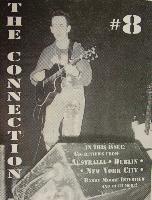
 Luka Bloom wearily pushes an index finger into the pouch beneath his right eye.
The Irishman has slept in the eight hours between getting off the plane and sitting
down to be interviewed, but not enough. He is sluggish at first, wary of the
interrogation, uncomfortable - as always, he later points out - with the process
of being photographed. But as the conversation turns to the destruction of some
of music's arbitrary boundaries, a subject near to his creative heart, he loses
the glazed look, revealing himself as a nimble and entertaining thinker
and something of a pop theoretician.
Luka Bloom wearily pushes an index finger into the pouch beneath his right eye.
The Irishman has slept in the eight hours between getting off the plane and sitting
down to be interviewed, but not enough. He is sluggish at first, wary of the
interrogation, uncomfortable - as always, he later points out - with the process
of being photographed. But as the conversation turns to the destruction of some
of music's arbitrary boundaries, a subject near to his creative heart, he loses
the glazed look, revealing himself as a nimble and entertaining thinker
and something of a pop theoretician.
 Liquids like Ballygowan Water don't have hallucinatory after-effects, and that's
the only substance you're likely to find backstage at one of Barry Moore's gigs
these days. Maybe it's the bubbles in the stuff or maybe it's the fact that he
knows that I'm in the audience, but Barry Moore's first solo showcase since
the demise of Red Square comes across as his best yet. Gone is the
repertoire which catalogued the world's ills, a young Moore's almanac, of
disaster and despair. The new Moore is writing about anything and everything
from Picasso's mistress to a train journey between Dublin and Cork. The lyrics
are sharp, the performance is vibrant, and through it all runs the feeling that Barry
Moore has found his voice - that, in artistic terms, he's arrived.
Liquids like Ballygowan Water don't have hallucinatory after-effects, and that's
the only substance you're likely to find backstage at one of Barry Moore's gigs
these days. Maybe it's the bubbles in the stuff or maybe it's the fact that he
knows that I'm in the audience, but Barry Moore's first solo showcase since
the demise of Red Square comes across as his best yet. Gone is the
repertoire which catalogued the world's ills, a young Moore's almanac, of
disaster and despair. The new Moore is writing about anything and everything
from Picasso's mistress to a train journey between Dublin and Cork. The lyrics
are sharp, the performance is vibrant, and through it all runs the feeling that Barry
Moore has found his voice - that, in artistic terms, he's arrived.
